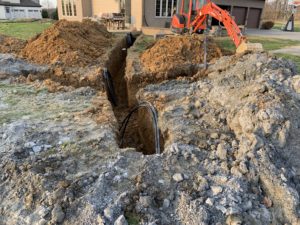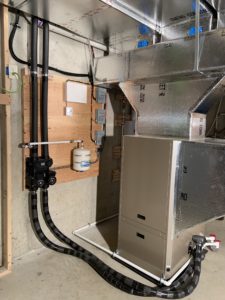At RSC Heating & Air Conditioning, we get a lot of questions about geothermal heating and cooling. To answer all of your burning questions about this energy source, we’ve compiled all of the frequently asked questions we get from our customers. Continue reading to find all of the answers to your questions:
- How does geothermal energy work?
- How long does it take to install a geothermal heating and cooling system?
- What is the general cost of installing a geothermal system?
- What are the benefits of geothermal energy?
- Are there any disadvantages of geothermal?
How does geothermal energy work?
Geothermal systems, also called ground source heat pumps, move heat from the earth into your home using the same technology a refrigerator uses to cool your food. Geothermal is a sophisticated, yet completely natural solution to home climate control.
For more information, check out How Geothermal Works on our website.

How long does it take to install a geothermal heating and cooling system?
Installing a loop system usually takes a total of about two days. Once the loop system is in the ground, it will only take a day to install the rest of the conventional geothermal system. The good news is that your home could have a new source of energy in a matter of three days or less.
What is the general cost of installing a geothermal system?
There are two variations of underground looping that can be installed: an open loop or a closed loop system. This may have an effect on the estimated cost of installing a geothermal heating and cooling unit for your home. For a home that is about 2,000 square feet, installing a geothermal unit could cost about $15,000 to $20,000.
Thankfully, you don’t have to worry about paying that much up front. We offer fantastic financing opportunities to fit your budget at RSC Heating & Air Conditioning.
What are the benefits of geothermal energy?
If installed properly, there are many advantages to using a geothermal system in your home. We extensively covered the benefits of geothermal heat pumps on our blog, but here are some of the advantages of geothermal energy:

- Environmentally friendly and highly efficient heating and cooling option
- Provides a renewable energy source
- Not dependent of weather
- Produces very low levels of noise when running
- Reduces energy and the overall expense of utility bills
- Eligible for federal income tax credit
- No risk of carbon monoxide poisoning
- Piping lasts a minimum of 100 years
- Located indoors
Are there any disadvantages of geothermal?
If you have a system that is designed well and you’ve hired a reliable company to install it, you can avoid some of the concerns that homeowners have about heating and cooling units. A geothermal system will likely pay for itself a few years after installation, however, the disadvantages of geothermal include:
- The initial installation cost is higher than other heating and cooling units.
- Additional costs can be incurred during the well drilling process due to excess water and water containment costs required by some townships.
- There may be some additional costs to restore your lawn after excavation is complete.
Switch to Geothermal Energy Today
Geothermal heating and cooling systems are a great alternative for keeping your home comfortable during any season. If we haven’t answered all of your questions about geothermal energy for your home, or if you’re interested in making the switch to geothermal today, please contact RSC Heating & Air Conditioning for more information. We are always happy to help!




